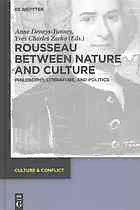
Rousseau between nature and culture : philosophy, literature, and politics PDF
Preview Rousseau between nature and culture : philosophy, literature, and politics
Rousseau Between Nature and Culture Culture & Conflict Edited by Isabel Capeloa Gil and Catherine Nesci Editorial Board Arjun Appadurai · Claudia Benthien · Elisabeth Bronfen · Joyce Goggin Lawrence Grossberg · Andreas Huyssen · Ansgar Nünning · Naomi Segal Márcio Seligmann-Silva · António Sousa Ribeiro · Roberto Vecchi Samuel Weber · Liliane Weissberg · Christoph Wulf Volume 8 Rousseau Between Nature and Culture Philosophy, Literature, and Politics Edited by Anne Deneys-Tunney and Yves Charles Zarka In collaboration with Karen Santos da Silva ISBN 978-3-11-045075-0 e-ISBN (PDF) 978-3-11-045718-6 e-ISBN (EPUB) 978-3-11-045667-7 ISSN 2194-7104 Library of Congress Cataloging-in-Publication Data A CIP catalog record for this book has been applied for at the Library of Congress. Bibliographic information published by the Deutsche Nationalbibliothek The Deutsche Nationalbibliothek lists this publication in the Deutsche Nationalbibliografie; detailed bibliographic data are available on the Internet at http://dnb.dnb.de. © 2016 Walter de Gruyter GmbH, Berlin/Boston Cover image: © Stephen Tunney Printing and binding: CPI books GmbH, Leck ♾ Printed on acid-free paper Printed in Germany www.degruyter.com Table of Contents Editions and Abbreviations VII Anne Deneys-Tunney, Yves Charles Zarka Introduction 1 I Technology: Between Nature and Anti-Nature Pierre Guenancia Rousseau, Lévi-Strauss’s “Master” 11 Philip Knee Rousseau and the Authority of Nature 27 Stéphane Lojkine Nature as Blind Space 45 Anne Deneys-Tunney Rousseau and Technology: The Invention of a New Ecological Paradigm 57 Masano Yamashita Rousseau and “The Mechanical Life” 67 II Politics and Ethics: Beyond the Nature/Culture Polarity Paul Audi Rousseau’s Ethical Freedom 85 Pasquale Pasquino Remarks on Rousseau’s Dictatorship: Between Machiavelli and Carl Schmitt 101 Simon Critchley Politicsand Religion in the Social Contract 111 VI TableofContents Mira Morgenstern Alienation and Freedom: Rousseau and Transcending Nature/Culture Dualism 119 Yves Charles Zarka Rousseau and the Sovereignty of the People 137 III The Philosophical Novel: Culture as Nature’s Supplement Christophe Martin Nature and Supplementation in Julie ou La Nouvelle Héloïse 153 Lucien Nouis Recomposing the Diffracted Text: Rousseau and the Metaphor of the Book of Nature 167 Tanguy L’Aminot Nature, Culture, and the Social Contract: Emile’s point of view 179 Contributors 197 Index 201 Editions and Abbreviations Unlessotherwiseindicated,thereferencestoRousseau’sworksandcorrespond- ence are from the following standard editions and will be indicated right after references or quotations in the body of the chapters, rather than in footnotes. Rousseau,Jean-Jacques.Œuvrescomplètes.Gen.Eds.BernardGagnebinandMarcel Raymond.5vols.Paris: Gallimard,“BibliothèquedelaPléiade,” 1959–1995. ThetitlewillbeabridgedthroughoutasOCfollowedbythevolumenumberandthe pagination in Arabicnumerals. Rousseau,Jean-Jacques.TheCollectedWritingsofRousseau.Gen.Eds.RogerD.Mas- tersandChristopherKelly.13vols.Hanover:UPofNew England,1990–2010. ThetitlewillbeabridgedthroughoutasCWfollowedbythevolumenumberandthe pagination in Arabicnumerals. CorrespondancecomplètedeJean-JacquesRousseau.Ed.RalphA.Leigh.52vols. Geneva: Institut et Musée Voltaire; Madison: U of Wisconsin P; Oxford:Voltaire Foundation,1965–1998. ThetitlewillbeabridgedthroughoutasCCfollowedbythevolumenumberand the pagination in Arabic numerals. In addition,the following acronyms will be used to refer to Rousseau’s works: C: forLesConfessions(OC1);TheConfessionsandCorrespondence,IncludingtheLettersto Malesherbes(CW5). CS: forDuContratSocial(OC3);SocialContract(CW4). D: forRousseauJugedeJeanJaques(OC1);Rousseau,JudgeofJean-Jacques:Dialogues(CW1). DSA: forDiscourssurlessciencesetlesarts(OC3);DiscourseontheSciencesandArts(CW2). E: forÉmile,ouDel’éducation(OC4);EmileorOnEducation(CW13). EOL: forEssaisurl’originedeslangues(OC5);EssayontheOriginofLanguages(CW7). Julie: forJulie,ouLaNouvelleHéloïse(OC2);JulieortheNewHeloise(CW6). LA: forLettreàd’Alembert(OC5);Lettertod’Alembert(CW10). LF: forLettreàM.deFranquières(OC4);LettertoFranquières(CW8). LM: forLettresmorales(OC4). R: forLesRêveriesdupromeneursolitaire(OC1);TheReveriesoftheSolitaryWalker(CW8). SD: forDiscourssurl’origineetlesfondementsdel’inégalitéparmileshommes[Second discours](OC3);DiscourseontheOriginsofInequality[SecondDiscourse](CW3). Whencitationsandpaginationsrefertobotheditions,referencestotheEnglish editionswillfollowthepaginationinOCandwillbegiveninbrackets,suchas: Second Discourse (OC 3:122 [CW 3:12]),or (SD 122 [12]). Anne Deneys-Tunney, Yves Charles Zarka Introduction LikethestatueofGlaucus,whichtime,sea,andstormshad sodisfiguredthatitlookedlesslikeaGodthanawildBeast, thehumansoul,alteredinthebosomofsocietybya thousandcontinuallyrenewedcauses,bytheacquisition ofamassofknowledgeanderrors,bychangesthat occurredintheconstitutionofBodies,andbythe continualimpactofthepassions,has,sotospeak, changeditsappearancetothepointofbeingnearly unrecognizable;and,insteadofabeingactingalways byfixedandinvariablePrinciples,insteadofthat Heavenlyandmajesticsimplicitywithwhichits Authorshadendowedit,onenolongerfindsanything exceptthedeformedcontrastofpassionwhich believesitreasonsandunderstandingindelirium. (Rousseau,Preface, SecondDiscourse(122[12])) Itisofcoursenoaccidentthatwebeginthevolumewiththisquotation.Itun- derscores what is most at stake in the relationship between nature and cul- ture, not only in Rousseau’s thought, which is to be expected, but for this day and age as well. Indeed, it contains Rousseau’s characteristic imprint about loss, degradation, confusion, even the degeneration from natural man to cultural man. But if we put aside this value judgment – though we would have to, in many respects, counterbalance it with what Rousseau sayselsewhere–thismetaphorofGlaucus’sstatue,whosemeaningwillsub- sequently be developed in the preface to the Discourse on the Origins of In- equality(orSecondDiscourse),sayswhatismostessentialaboutthecontem- porary confusion regarding the relationship between nature and culture.We will return to this further down. The relationship between nature and culture is today one of the major concerns at the heart of the humanities and social sciences. If thinking this rapport as a simple duality no longer seems substantiated in light of the ef- fects of human action over nature, the earth’s vulnerability, and the status ofotherlivingspecies,particularlyanimals,howarewetoredefinethisrela- tionship? TheoriginalityofthisprojectconsistsinareturntoJean-JacquesRousseau’s workin order tofind, if not answers, at least some enlightening interpretations anddirectionslikelytoguidetoday’sresearch.Thisprojectisthustwofold:ahis- 2 AnneDeneys-Tunney,YvesCharlesZarka torical examination of Rousseau’s works and ideas, and an illustration of the waysinwhichthesetextsandideasshedlightoncontemporaryproblemswithin the humanities and social sciences. Rousseauhasindeedplacedtherelationshipbetweennatureandcultureat the center of his philosophical thought (Discourse on the Origins of Inequality, Essay on the Origin of Languages, The Social Contract,etc.) as well as of his lit- erarytexts(Emile,ReveriesofTheSolitaryWalker,etc.).IncontrasttoEnlighten- ment optimism, in which his thought nevertheless participated, Rousseau has shownthatthedevelopmentofcultureandoftechnicalprogress–theappropri- ation of the earth,the disappearanceof simple waysof life (such as thatof the Hottentots living on hunting and fishing), and the social inequalities that have resultedfromsuchchanges–shouldnotbeconsideredfromtheunilateralper- spectiveofanarrativeofhumanprogress,featuringsubjectsseekingrightsand freedom throughout history. Rousseau saw the destructive aspects of men’s ac- tions and desires when they become unilateral, having no other concern than the satisfaction of amour-propre (self-love): such unilateralism conceals a dis- figuration,evenadestructionofthenaturewithinandoutsideofus.Thislesson is extremely important, fordoes such a diagnosis not resonatewith the one we have come to make, nowadays, on the destruction of nature by man-made fac- tors and environmental disasters? Doesthismeanthattheparadigmofnaturehasbeenlost?Doesitmeanthat manhimselfislostbywayoftheimpossibilitytogobackwards,backtothetime ofanowlost“pure”nature?The answertothesequestions can onlybeno,be- causeRousseaualsodevelopedapositiveoutlookonculture.Asregardstopol- itics, shouldn’t the social contract help man transition from a savage form of freedom–closetoinstinct–toamoralandcivilfreedomthatraiseshumanbe- ingstothelevelofresponsibility?Doesn’tEmileprovidethewaytoaneducation guidedbynature?Itisclearthatinbothhisphilosophicalandhisliteraryworks, Rousseau’s answers are far from unequivocal. Our belief is that we still have much to learn from Rousseau.The considerable importance granted to him by ClaudeLévi-Straussontheonehand,andJacquesDerridaontheother,despite theirconsiderabledifferences,testifiestohowtopicalRousseauremainsincon- temporary thought. Aswe will see,the totalityof Rousseau’s œuvrehelps us think through the complex relationships between nature and culture. Nature is both a universal substratum,andthefoundationfromwhich(andattimesagainstwhich)culture establishesitself.Modernculture,saysRousseau,hasseparatedoremancipated itself from this foundation, and has degenerated into a society of luxury, in- equality,andmoralcorruption.Furthermore,Rousseau’sworkstrivestorestruc- ture nature, within the political, moral, and anthropological context of social
